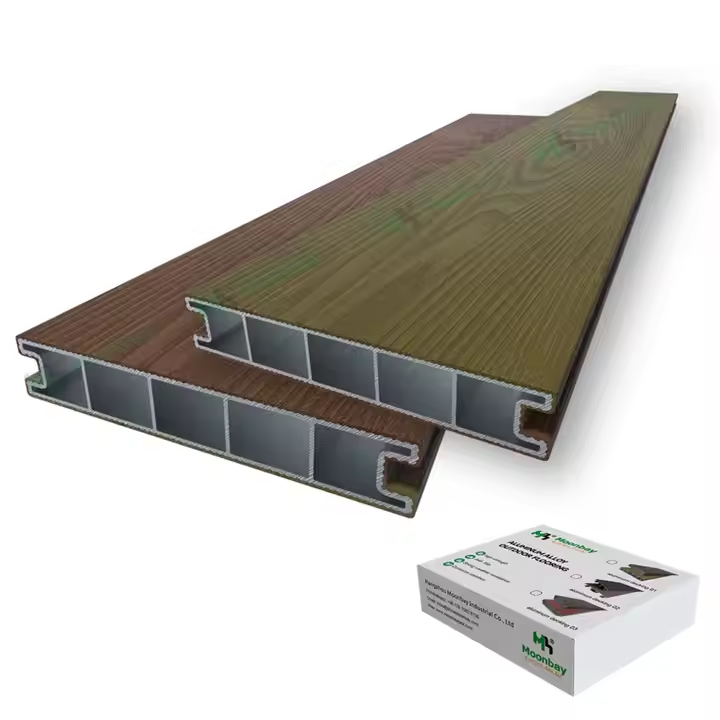Aluminum Plastic Flooring: Why it Matters.

Aluminum plastic flooring is changing the paradigm and the way construction professionals are approaching construction projects globally. The approach gives an innovative solution to the builders in which aluminum strength is combined with the flexibility of superior polymers. I have seen how this composite technology resolves serious problems such as pricing and durability that we all face in construction industry over the years
The building environment in Kenya requires materials that could serve our tough climatic conditions and provide superior performance and affordability. Our construction environment is characterized by rapid temperature fluctuations, variation in humidity as well as the requirement of quick installation of flooring solutions; such factors tend to defy traditional flooring solutions in many instances. Here is where the concept of aluminum plastic flooring comes to save the situation.
What is Aluminum Plastic Flooring
Aluminum plastic flooring which is also as Aluminum Composite Panel (ACP) flooring refers to composite flooring panels that combine aluminum (often as a structural skin or profile) with a plastic or polymer core or layer. This creates a hybrid material that leverages aluminum's lightweight strength and plastic's resilience or design flexibility.
Components of Aluminum Plastic Sheets
The composite nature eliminates the brittleness of pure aluminum and the structural limitations of plastic alone. You get thermal stability from aluminum combined with the flexibility and impact resistance of engineered plastics.
| Component | Percentage | Function | Benefits |
|---|---|---|---|
| Aluminum Alloy Sheets | 60-70% | Structural strength, corrosion resistance | Durability, weather resistance |
| Plastic Polymer Core | 25-35% | Flexibility, insulation | Impact resistance, thermal properties |
| Adhesive System | 5-10% | Bonding, integrity | Long-term stability, delamination resistance |
Types of Aluminum Plastics Flooring
| Type | Structure | Core Features | Typical Use |
|---|---|---|---|
| Aluminum Foam Composite | Aluminum skins, foam plastic core | High strength/weight, insulation | Bridges, roofs, industrial floors |
| Aluminum Profile-Laminated Plastic | Aluminum tread, PVC backing | Non-slip, fire-resistant, quick install | Commercial walkways, public corridors |
| Modular Sandwich Panel | Plastic-foam or honeycomb core, aluminum faces | Modular, lightweight, thermal insulation | Clean rooms, cold storage, truck bodies |
Why Does Aluminum Plastic Flooring Matter?
Performance Characteristics
Here in Kenya and across Africa, flooring performance isn't just about what looks good; it's about what endures under stress. Aluminum plastic floors are loved for their:
Strength-to-Weight Ratio: Aluminum is light (a boon for high-rise builds) but highly resistant to bending and impact.
Longevity: Both components are highly durable and resist wear and deformation under load, especially compared to wood or basic plastics.
Water-resistance: These floors do not absorb water, making them a favorite in humid climates or wet zones.
Corrosion resistance: Aluminum naturally resists corrosion, and plastic does not rust at all. This helps in both indoor and outdoor applications.
Fire-resistance: Especially when equipped with fire-retardant plastic, these floors are increasingly used where safety codes are strict.
Durability: How Does it Hold Up?
| Property | Aluminum Plastic Floor | Ceramic Tile | Wood | PVC Only |
|---|---|---|---|---|
| Wear Resistance | Very High | High | Variable | Moderate |
| Water Resistance | High | Moderate | Low | High |
| Impact Resistance | High | Low | Variable | Moderate |
| Lifespan (Years) | 20–30+ | 10–25 | 10–20 | 10–15 |
| Fire Resistance | High (with proper core) | Low | Low | High |
| Recyclability | Yes | Moderate | Yes | Difficult |
| Traditional Material | Aluminum Plastic Flooring | Advantage |
|---|---|---|
| Concrete: 2400 kg/m³ | ACP: 3-7 kg/m² | 95% weight reduction |
| Steel: High maintenance | ACP: Minimal maintenance | 70% maintenance cost reduction |
| Wood: Moisture sensitive | ACP: Moisture resistant | Extended lifespan |
| Ceramic: Brittle | ACP: Impact resistant | Reduced breakage costs |
Real-World Applications: Who Uses It and Why?
Commercial and Industrial Applications
Airports: Flooring in major terminals demands lightness, strength, and fire resistance. Nairobi's Jomo Kenyatta International Terminal renovations, for instance, have shifted to hybrid floors for heavy trolley and foot traffic.
Hospitals: Hygiene and ease of cleaning, plus resistance to chemicals.
Offices/Data Centers: Raised flooring with aluminum frames and plastic infill for cabling and cooling management
Residential and Retail Trends
Modern homes: Timeless looks, anti-slip finishes, and modular panels that allow DIY and rapid installation.
Shopping malls: Easy to clean, high weight-bearing capacity, and updated with custom visuals (wood- or stone-look plastic).
Related Questions: How does aluminum plastic flooring perform in Kenya's climate?
Kenya's climate presents unique challenges - from coastal humidity to highland temperature variations. The aluminum skin provides excellent moisture barrier properties, while the plastic core prevents thermal bridging that could cause expansion issues.
Aluminum Plastic Flooring Vs Alternatives
| Feature | Aluminum Plastic Flooring | Vinyl/Plastic-Only | Laminate/Laminate with Al Oxide | Stone/Tile | Steel Raised Floors |
|---|---|---|---|---|---|
| Key Manufacturer Example | Alu Floors Scandinavia | Tarkett | KronoSwiss | RAK Ceramics | Tate Access Floors |
| Initial Cost | Medium | Low | Medium | High | High |
| Installation Speed | Fast (modular) | Fast | Fast | Slow/Skilled | Skilled |
| Fire/Heat Stability | High | Moderate | Low | High | Very High |
| Recyclability | High | Mixed | Low | Moderate | High |
| Common Place Installed | Airports, Labs, Malls | Homes, Schools | Offices, Homes | Hotels, Hospitals | Data Centers |

Technical Installation and Maintenance of Aluminum Plastic Flooring
Transitioning into the next critical arena—installation, maintenance, and regulatory guidance—builders, facility managers, and site supervisors in Kenya require clear, actionable frameworks to maximise the benefits of aluminum plastic flooring throughout its lifecycle.
Step-by-Step Installation Guide
Following the correct procedure ensures maximum durability and performance:
| Installation Step | Key Actions | Tools/Materials | Notes |
|---|---|---|---|
| Site Preparation | Level subfloor, remove debris, ensure moisture control | Spirit level, primer | Moisture barriers recommended for ground floors |
| Panel Layout & Cutting | Lay panels to fit room shape, cut as needed | Measuring tape, saw | Use rubber spacers for expansion gaps |
| Underlayment Application | Install anti-slip or sound-adsorbing underlay | Underlay sheets, adhesive | Especially important in multi-storey or high-traffic installations |
| Panel Fixing | Secure panels using recommended adhesives or mechanical fasteners | Flooring adhesive, screws | For floating floors, use interlocking edges as specified |
| Finishing & Edging | Place edge trims, secure transitions between surfaces and doorways | Metal or plastic trims | Check for tripping hazards and flatness |
| Final Inspection | Confirm alignment, stability, and finish appearance | Visual and tactile check | Document for warranty/insurance |
Related Questions
Can aluminum plastic flooring be installed over existing tiles or wood?
Yes, if the subfloor is structurally sound, level, and properly cleaned.What adhesive is best for heavy-use zones?
Polyurethane or solvent-free adhesives rated for both aluminum and polymer.
Maintenance and Cleaning Best Practices
What sets aluminum plastic flooring apart is its straightforward care routine, which balances cost-saving and longevity:
Routine Dry Cleaning: Soft brooms or commercial dust mops
Spill and Stain Removal: Neutral detergents; avoid acidic/alkaline cleaners
Periodic Deep Cleaning: Soft pads with mild cleansers
Re-Edging & Sealing: Inspect trims every 6–12 months in high-traffic areas
Scratch or Dent Repair: For deep impacts, replace the affected panel only
| Maintenance Task | Frequency | Recommended Tools/Materials |
|---|---|---|
| Sweeping/Dust Mopping | Daily | Microfiber mop, dust mop |
| Damp Mopping | Weekly | Neutral detergent, damp mop |
| Inspection | Biannual | Visual inspection, edge check |
| Panel Replacement | As needed (damage) | Spare panel, adhesive, trim pieces |
Related Questions
Does water damage affect panel life?
Not typically—aluminum and plastic cores resist water, but edge seals and trims must remain intact.Can heavy furniture dent the surface?
Unlikely, especially when using protective pads under legs or bases.
Compliance and Regulatory Considerations for Kenya
Installing advanced flooring solutions like aluminum plastic flooring demands compliance with Kenya’s national and county construction standards:
Fire Code Compliance: Ensure chosen panels are certified fire-retardant per KEBS and Kenya Fire Safety Code.
Environmental Regulations: Where possible, select products labeled recyclable and low-VOC to meet green building benchmarks.
Safe Installation Practices: Only trained professionals should handle industrial adhesives and power tools, reducing occupational hazards.
Product Certification: Demand product sheets, test certificates, and warranties from global and local suppliers.
Common Pitfalls and Local Supplier Warnings
Rely on reputable manufacturers and suppliers who offer traceable warranties, clear installation guides, and after-sales technical support. Common pitfalls to avoid include:
Using uncertified panels—a frequent issue in informal markets
Skipping subfloor preparation—leads to buckling or edge damage
Misusing adhesives—not all are compatible with aluminum or specific polymer cores
Aluminum Plastic Flooring in the Kenyan Climate: Performance Insights
Unique challenges in East Africa shape field performance:
| Challenge | Aluminum Plastic Solution | Outcome/Precaution |
|---|---|---|
| High humidity/rain | Impervious to moisture; no warping | Ensure edge trims are watertight |
| Temperature swings | Dimensional stability from hybrid core | Maintain expansion gaps for safety |
| High foot traffic | Wear-resistant aluminum surface | Schedule regular inspections |
| Abrasive red dust | Easy-wipe surface | Daily dry cleaning recommended |
Frequently Asked Questions
Are aluminum plastic floors noisy?
Not when properly paired with underlayments tuned for acoustic dampening—a major advantage for hospitals and office buildings.
Does direct sunlight fade the flooring?
Yes, provided the flooring is rated for the expected heating temperatures and installation follows manufacturer guidance.
Is it difficult to repair damaged panels?
No. Most systems are modular—remove the damaged component and fit a replacement with minimal skill or tools.
What warranty period is standard for these floors?
Top-tier manufacturers offer 10–25 years, often with provisions for both residential and heavy commercial use.
Can aluminum plastic flooring be installed in all weather conditions?
While more weather-tolerant than many materials, extreme conditions should be avoided. Light rain won't damage the panels, but proper adhesive curing requires appropriate temperature ranges. Wind can affect handling of large panels.





